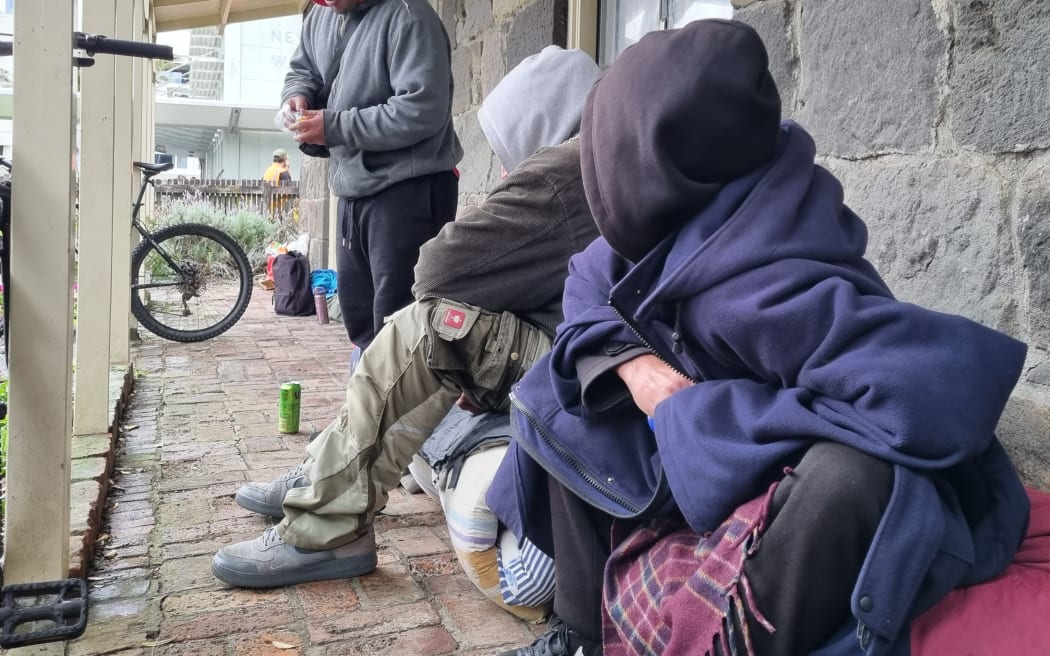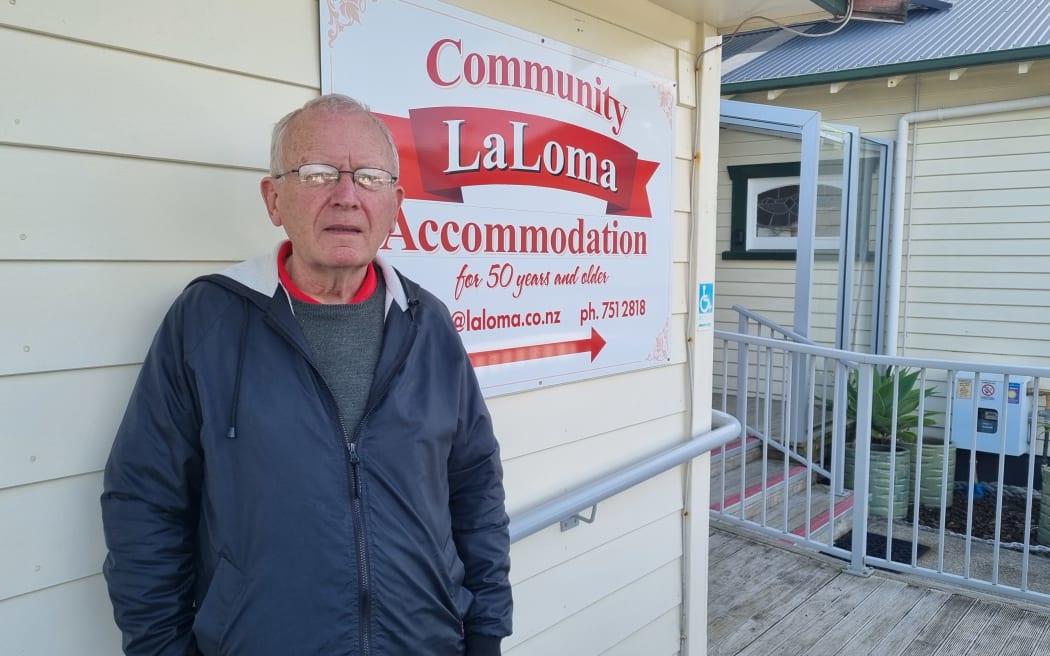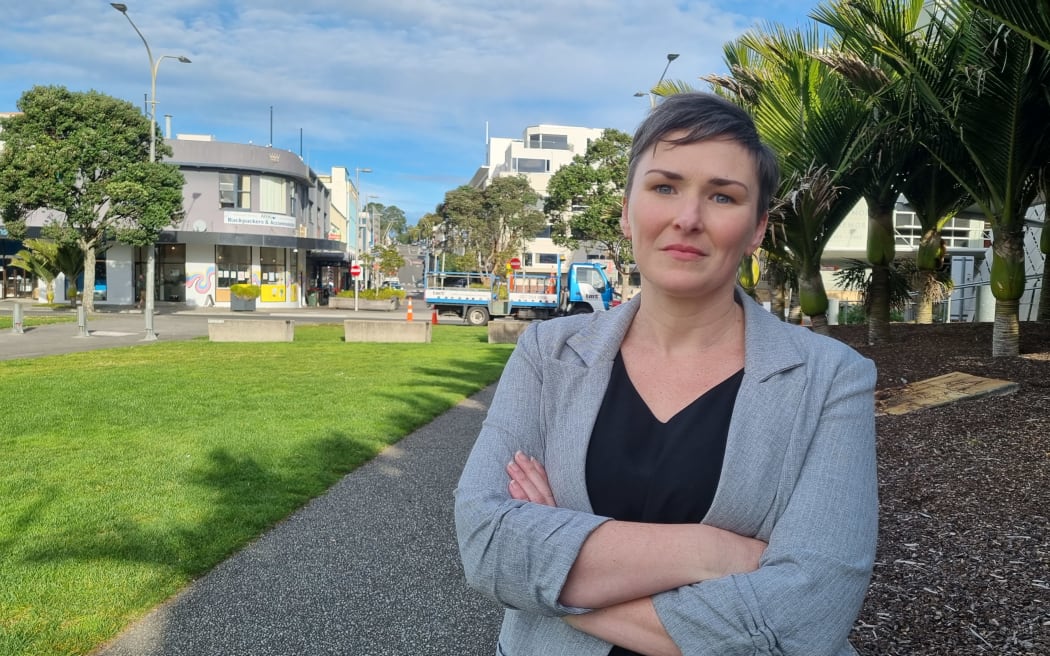
A group of homeless people sheltering under the verandah of the earthquake-prone Richmond Cottage in New Plymouth. Photo: RNZ / Robin Martin
A New Plymouth emergency housing provider says a council survey asking what can be done about the city's housing crisis feels like a cruel joke.
The council is asking residents for feedback on five issues - including housing - ahead of drawing up its long-term plan.
There are about 390 people waiting for social housing in New Plymouth.
The council's Gimme Five survey asks how it can tackle the problem.
Eric was one of a group of rough sleepers recently moved on from the library at Puke Ariki.
He was not expecting much from council.
"They went and put two bright lights in there, so we'd move along, and if that wasn't bad enough, they started locking the public bus stops and that.
"Cause we need showers and that so I use the water fountains in the toilet and everyone seems to have a problem.
"And so the only problem is because the council is moaning. The council is part of the problem and no-one wants to hear it."
Eric, who had been living on the streets for three years, and his mates are now sheltering at the earthquake-prone Richmond Cottage across the road.
New Plymouth Emergency Shelter Trust chairperson Peter Coles ran the city's Men's Shelter.
He said the council was not looking to help people like Eric or the other 200 or so in the district living rough, couch surfing or sleeping in cars.
Coles said the survey on housing was a cruel joke.
"We've only got nine beds and that's been the issue for a long time and I've made numerous appeals to the council and they've told us straight to our face that the council has no responsibility to house homeless people, it's entirely the government's responsibility.
"You know, don't come to us and they haven't moved from that and they won't ever move from that."
He said his clients were unlikely to become model citizens.
"The people we look after are never going to become tenants. Very, very few of them are ever going to become tenants.
"They are not that sort of people. They are transient, they've got mental health issues, they've got drug issues, they've got previous convictions that bars them from any employment, they're illiterate.
"And the ones that come out of prison can't even sign their name. It's really, really sad."
Coles worried about the future of the people he helped.
"Our guys are on the margins of society. I mean they talk about accommodation and all these plans for building accommodation and low-cost accommodation.
"It's all about assuming people will come and sign a tenancy agreement and become a good tenant and get a job and all of that.
"How is that ever going to happen for these guys, our guys?"
Coles wanted the council to help fund another bigger better shelter.
Tim Hall lived in a one-room bedsit at a former rest home in Moturoa which had been converted into accommodation for over 55s.
"So, it's rather like living in a student hostel really, like living in a student room," he explained of his tiny room with ensuite for which he paid close to $300 a week.

Tim Hall is grateful for his one-room bedsit but would like accommodation with more space. Photo: RNZ / Robin Martin
While grateful to have a roof over his head, the 67-year-old dreamt of something better.
"I need a little more space. I need somewhere where I can live independently and somewhere with security of tenure.
"I think when you reach retirement age, you don't want to live under the threat of being moved on by a landlord who perhaps decides to sell."
Hall moved to New Plymouth from Christchurch to be closer to his sister but found it impossible to find affordable standalone accommodation.
He recently lobbied council about investing in build-to-rent units.
"So what I was suggesting was that the council try to work with a new sector, it's called the build-to-rent investment sector, which attracts funds from institutional investors people like pension funds, banks, and insurance companies.
"That probably means councils not completely washing their hands of the issue, but actually providing some good sites that are suitable for social housing schemes and leasing those sites to investors."
The council has 140 flats for the elderly, but there are 80 people on its waiting list, and has recently bought a handful of units from a church group.

New Plymouth district councillor Amanda Clinton-Gohdes. Photo: RNZ / Robin Martin
The council recently set aside $200,000 to develop a housing strategy, which councillor Amanda Clinton-Gohdes was driving.
"We are hearing from all over the community, from all ends of the housing spectrum that they are having real issues, and that comes from emergency and transitional housing at one end right through to home ownership at the other and everything in-between, she said.
"In the emergency and transitional space, families are staying up to 12 months - sometimes much longer - which is essentially a family of four or five or in some cases even seven in a one-bedroom motel unit for over a year."
She said it was also recognised New Plymouth had a chronic shortage of one and two-bedroom properties.
Clinton-Gohdes said other cities - directed by their ratepayers - had decided to act.
"One example not far from home is Palmerston North where they've got Papaioea Place, where they've invested $14 million and they've developed so far to date 87 units, and that houses people who are in need and struggling to find rental accommodation, predominantly elder people and people with disabilities."
She said there had been problems with homeless people at Puke Ariki for a long time and security staff had to balance the needs of those individuals with those of the wider public.
The Gimme Five survey, which also asked for public feedback on Wild Weather Protection, Keeping the Economy Pumping, Keeping Rates Real and Changing the Game Plan for the Sports and Recreation Hub, closes at midday on 12 July.

